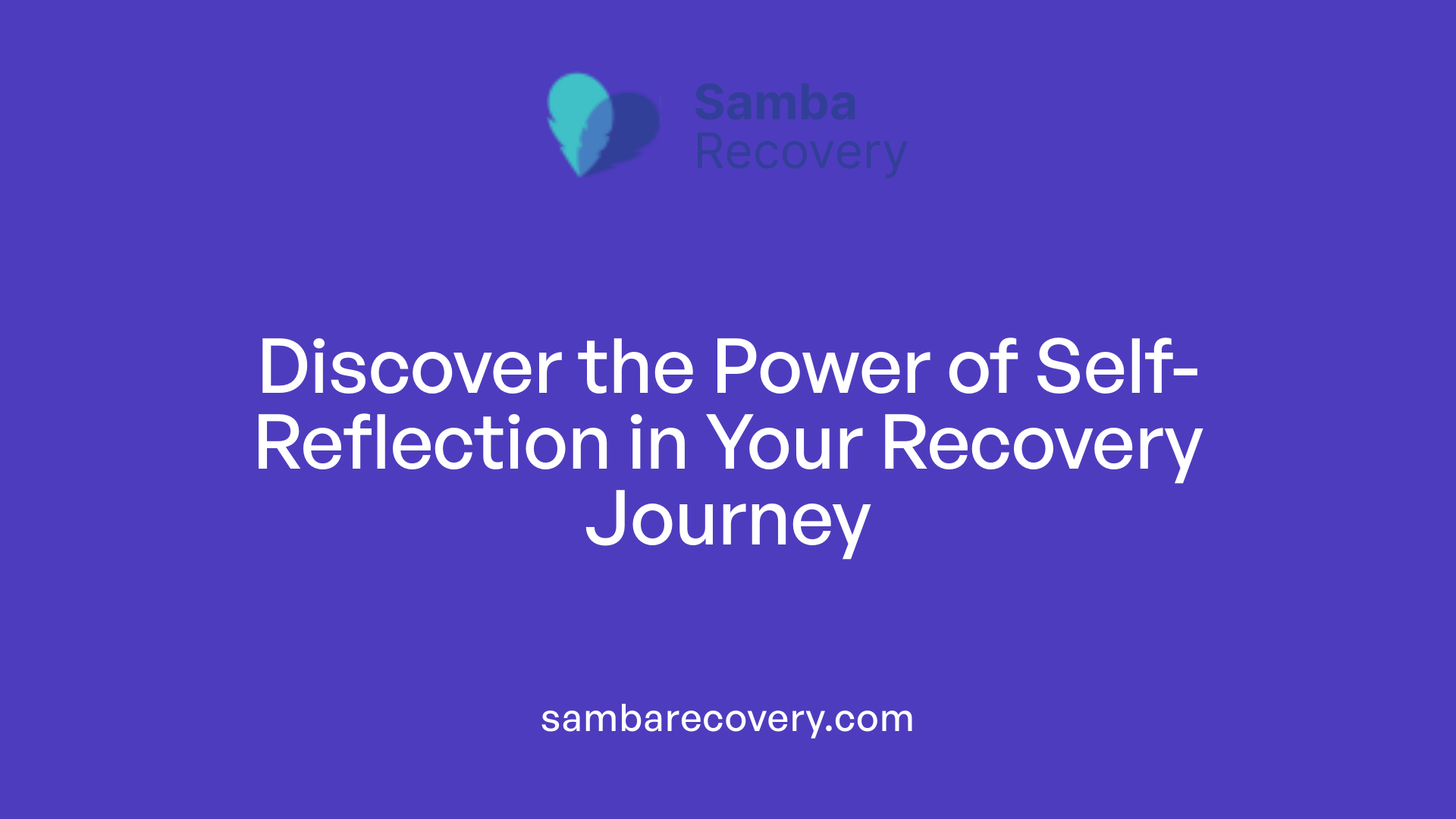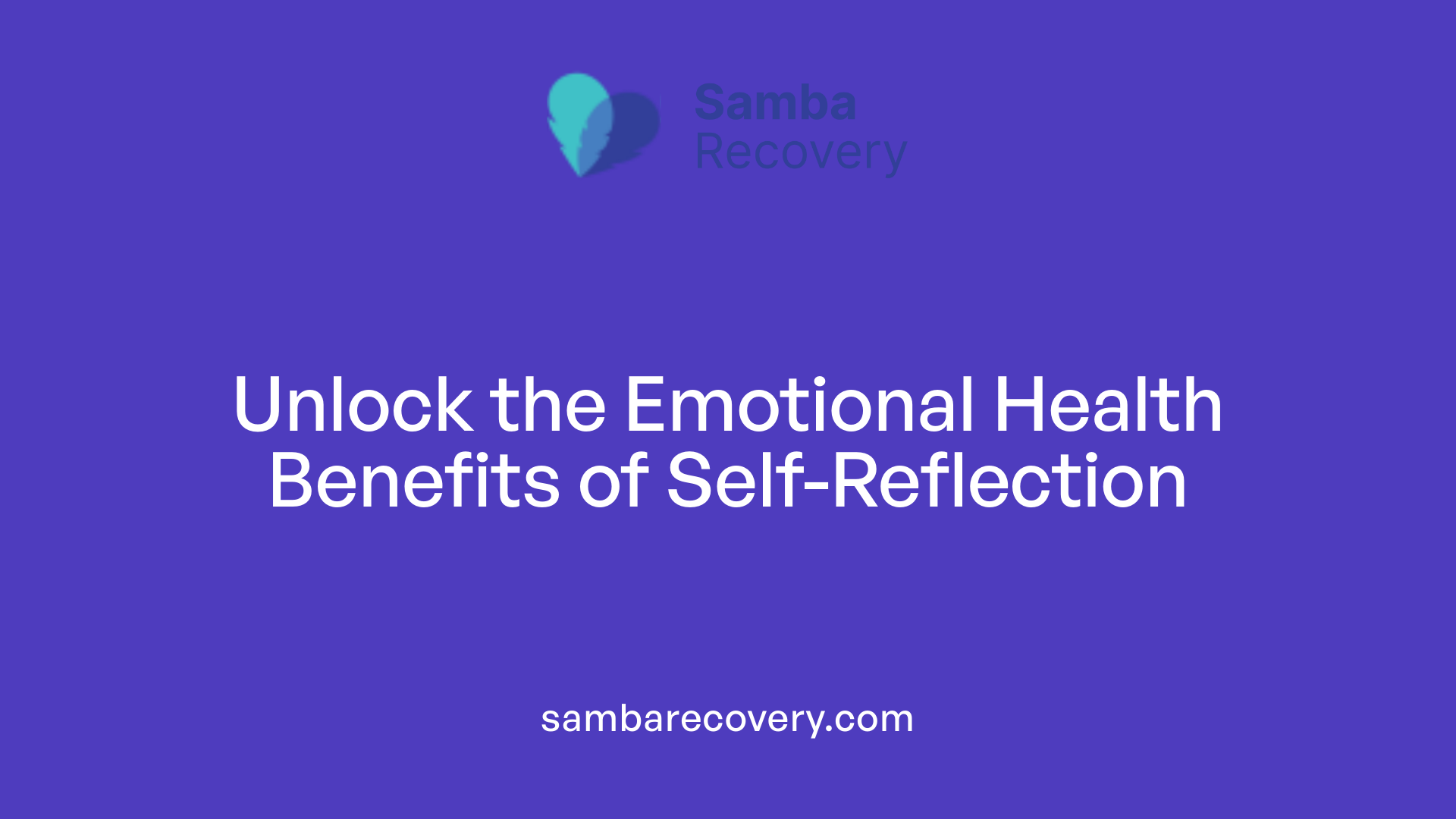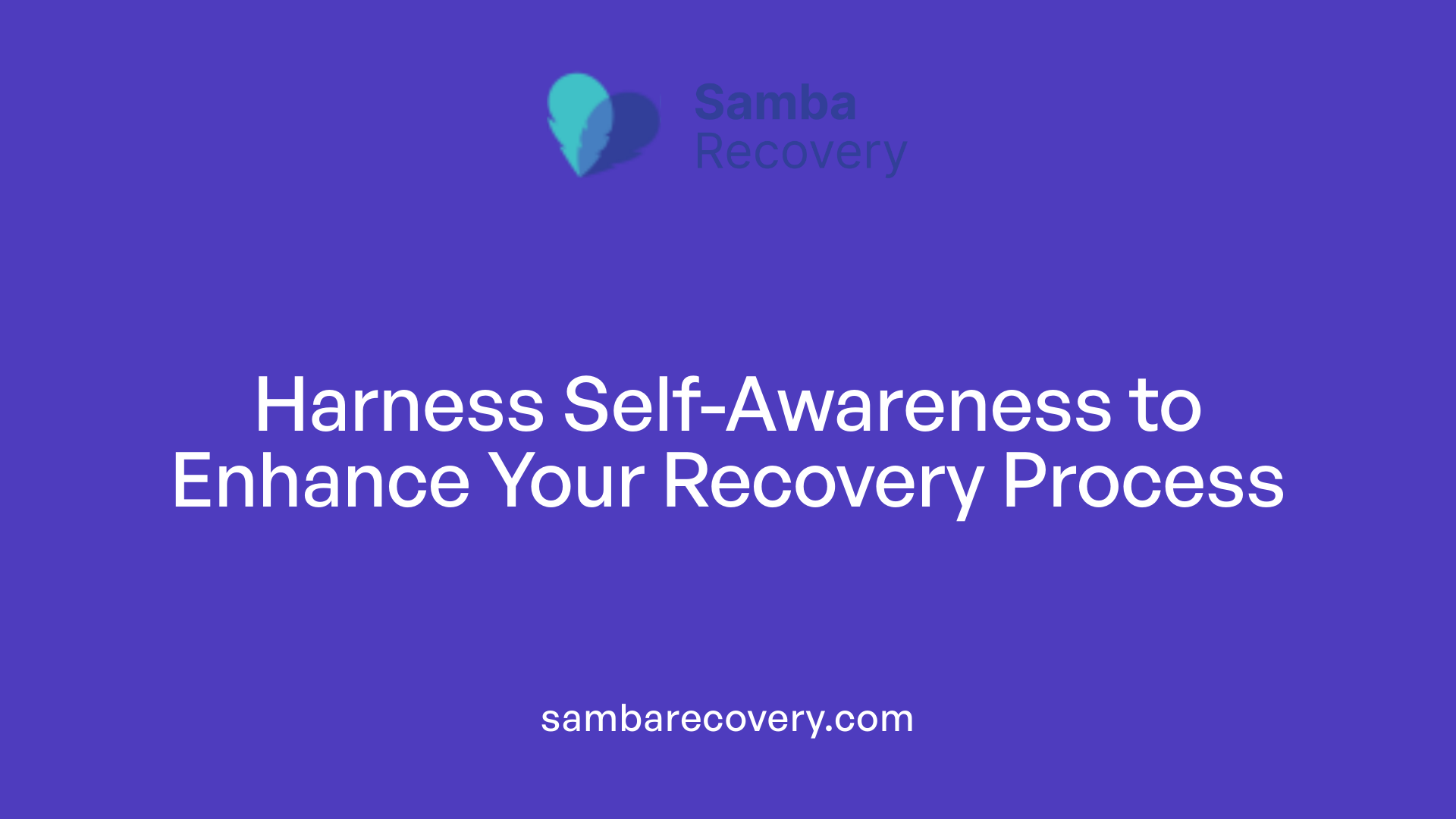Introduction to the Healing Power of Self-Reflection
Self-reflection is a critical component of addiction recovery, offering individuals the tools to understand their inner psychology and emotional landscape. As pathways to sobriety are often fraught with personal challenges and emotional upheavals, cultivating a practice of introspection is not merely beneficial but essential. This article delves into how self-reflection aids those striving for sobriety, exploring techniques and their benefits while underscoring its role in supporting both emotional wellness and personal growth.
The Transformative Role of Self-Reflection in Recovery

What role does self-reflection play in addiction recovery?
Self-reflection plays a crucial role in addiction recovery by helping individuals gain insight into the underlying issues contributing to their addiction. It allows them to identify personal triggers and patterns of behavior that may lead to relapse, fostering a deeper understanding of their emotional health.
Through self-reflection, individuals can confront painful emotions and beliefs, enabling them to develop coping strategies and healthier responses. They learn to analyze their feelings, which aids in recognizing self-destructive thoughts that often lead to substance use.
Additionally, recognizing both strengths and areas for growth can empower individuals, making them more resilient in their recovery journey. This heightened self-awareness is essential for maintaining long-term sobriety.
Understanding underlying issues
Identifying the root causes of addiction is part of the self-reflection process. Individuals can explore their past experiences, motivations, and emotional wounds that may have contributed to substance abuse. This reflective inquiry often involves practices such as journaling, meditation, or engaging with support networks, all of which provide safe spaces for introspection.
By acknowledging and addressing these underlying issues, recovery becomes more about healing rather than solely abstaining from substances. This holistic approach not only promotes personal growth but also enhances emotional stability during the recovery process.
Developing coping strategies
Self-reflection aids in the measurement of progress in dealing with triggers—emotions or situations that prompt cravings. By reflecting on past experiences, individuals can develop effective strategies to cope with these triggers in the future. Mindfulness techniques like breathwork further enhance this ability to manage cravings and emotional responses.
Keeping a journal can also serve this purpose, where individuals can track their emotional highs and lows, allowing for better coping mechanism development. Ultimately, engaging in periods of self-reflection fosters a balanced lifestyle, essential for sustaining recovery and personal growth.
Benefits of Practicing Self-Reflection for Emotional Health

What are the benefits of practicing self-reflection?
Practicing self-reflection promotes personal growth by allowing individuals to learn from past experiences and avoid repeating mistakes. It encourages self-awareness, helping people recognize both strengths and areas for improvement, which fosters emotional health and resilience. Self-reflection is particularly important in the context of addiction recovery, where understanding triggers and emotions plays a crucial role in long-term sobriety.
Promotion of self-awareness
Through reflective practices, such as journaling and mindfulness, individuals can explore their feelings and thoughts more deeply. This enhanced self-awareness can lead to better emotional regulation and understanding the dynamics of their addiction, paving the way toward healing. Notably, increased self-awareness enables individuals to confront self-destructive patterns and make constructive changes.
Decision-making enhancement
Self-reflection also sharpens decision-making skills by providing clarity on personal values and goals. By regularly evaluating their thoughts and actions, individuals can cultivate a deeper understanding of their motivations and behaviors. This reflective process not only aids in maintaining sobriety but also enhances overall emotional well-being and life satisfaction. The continuous evaluation helps individuals make more informed choices, ensuring alignment with their values and promoting a purposeful life.
Harnessing Self-Awareness in the Recovery Process

Importance of Self-Awareness in Recovery
Self-awareness plays a fundamental role in addiction recovery, as it allows individuals to understand their feelings, motivations, and behaviors. Without self-awareness, those in recovery may find it difficult to recognize the triggers that lead to substance use. Addiction often clouds judgment, leading to denial of emotional pain or stressors.
By fostering self-awareness, individuals can better grasp the root causes of their addiction and identify personal triggers. This understanding is crucial for developing effective strategies to prevent relapse. Methods such as journaling and self-reflection not only enhance self-awareness but also promote personal growth, enabling individuals to focus on healthier thought patterns and life choices.
Identifying Addiction Triggers
Recognizing addiction triggers is a vital component of maintaining long-term sobriety. These triggers can stem from situations, emotions, or environments that evoke cravings for substances. Self-awareness helps individuals acknowledge what influences their desire to use, facilitating proactive coping mechanisms that can mitigate relapse risks.
Establishing a daily practice of self-reflection allows individuals to stay alert to their emotional states. For instance, keeping a journal can reveal patterns in mood or behavior, making it easier to identify specific triggers and manage them effectively.
Self-Awareness Techniques
Practices aimed at enhancing self-awareness during recovery include:
- Mindfulness Meditation: Promotes present-moment awareness, helping to manage cravings and emotional regulation.
- Journaling: Helps process thoughts and feelings, providing insight into personal experiences and identifying emotional disturbances.
- Therapy: Engaging in counseling encourages deeper introspection and understanding of one’s behavior and values.
- Creative Activities: Activities like art or music can help express emotions and facilitate self-discovery.
Incorporating these techniques into daily life can significantly increase self-awareness, paving the way for a more resilient recovery journey.
Techniques for Effective Self-Reflection

Journaling as a Self-Reflection Tool
Journaling is a powerful and accessible way to engage in self-reflection during addiction recovery. It allows individuals to explore their thoughts, emotions, and experiences on a personal level. By documenting their feelings, they can gain insights, track their emotional patterns, and identify triggers that may lead to cravings. This practice is supported by research indicating that gratitude journaling improves self-esteem and enhances overall well-being, which contributes to better recovery outcomes.
Mindfulness and Meditation Practices
Mindfulness and meditation are essential practices that promote self-awareness and emotional regulation. Engaging in these techniques helps individuals manage stress and navigate cravings. Regular mindful breathing and meditation can increase one’s focus on the present moment, reducing the likelihood of relapse. These practices encourage individuals to confront and release pent-up emotions, ultimately fostering a deeper connection with themselves and their recovery journey.
Practical Self-Reflection Strategies
To successfully implement self-reflection, individuals can adopt several practical strategies:
- Set dedicated time for reflection: Allocate regular intervals in the week for introspection to build a routine.
- Engage in writing exercises: This can include creating letters to past and future selves, which aids in understanding personal growth.
- Utilize support networks: Sharing reflections with trusted individuals fosters a sense of accountability and community.
- Celebrate milestones: Acknowledging progress during recovery reinforces commitment and boosts motivation.
By integrating these techniques, individuals can significantly enhance their self-reflective practices, aiding their recovery and promoting long-term sobriety.
The Psychological Benefits of Journaling
Journaling Benefits
Journaling is a vital tool in addiction recovery, allowing individuals to express their thoughts and feelings freely. It fosters greater self-awareness, and as participants document their experiences, they often uncover underlying issues affecting their mental health. This self-exploration acts as a mechanism for personal growth and assists in tracking progress over time, enabling individuals to recognize patterns associated with their addiction.
Emotional Healing and Insights
Through journaling, individuals can achieve significant emotional healing. Writing about past traumas or negative experiences provides a safe space to confront painful memories. This process helps to unravel emotions linked to substance abuse, allowing for reflection and understanding. Insights gained through journaling lead to healthier coping strategies, supporting recovery and resilience.
Gratitude Journaling Effects
Research demonstrates that gratitude journaling yields positive psychological outcomes. By focusing on what they are thankful for, individuals can enhance self-esteem, elevate mood, and create a sense of well-being. This form of self-reflection not only cultivates resilience but also fosters a positive mindset essential for maintaining long-term sobriety. In summary, journaling serves as an impactful practice that nurtures emotional stability while reinforcing commitment to the recovery journey.
Managing Triggers and Emotional Wounds with Self-Reflection
Identifying Triggers
Identifying triggers is crucial for individuals in recovery; these are situations or emotions that can prompt cravings for substances. Engaging in self-reflection allows individuals to recognize their unique triggers, whether they stem from specific environments, social situations, or emotional states. By understanding these triggers, individuals can develop proactive strategies to avoid high-risk scenarios and maintain their sobriety.
Healing Emotional Wounds
Self-reflection also facilitates the healing of emotional wounds that may have contributed to substance abuse. By confronting and processing past traumas, individuals can address underlying issues that fuel their addictive behaviors. Techniques such as journaling or writing letters to one’s past self encourage emotional release and foster a deeper understanding of their experiences, paving the way for personal healing and growth.
Developing Coping Strategies
In addition to identifying triggers and healing emotional wounds, self-reflection helps individuals develop effective coping strategies. Mindfulness practices, such as meditation or breathwork, enhance self-awareness, enabling individuals to manage stress and navigate cravings. Recognizing personal strengths during reflection provides the confidence needed to implement healthy coping mechanisms, further empowering those in recovery to lead balanced and fulfilling lives.
Integrating Self-Reflection into 12-Step Programs
Self-reflection in Alcoholics Anonymous
Self-reflection is a fundamental aspect of recovery in Alcoholics Anonymous (AA). It encourages individuals to delve deep into their thoughts and emotions, fostering a heightened self-awareness that is crucial for successful sobriety. Through this introspective process, individuals gain insight into their triggers and understand the contexts that lead to substance use.
Steps 4 and 10 in AA
In AA, Steps 4 and 10 emphasize personal inventory and continuous self-assessment. Step 4 involves a thorough examination of past behaviors and mistakes, allowing members to confront their actions and take responsibility. This process aids emotional healing by helping individuals acknowledge regrets and work toward self-forgiveness. Meanwhile, Step 10 involves maintaining a daily inventory of thoughts and actions to correct any wrongs promptly and prevent negativity from building up.
Role in Relapse Prevention
Engaging in self-reflection not only bolsters self-awareness but also serves as a vital tool for relapse prevention. By consistently recognizing emotional disturbances and triggers, individuals are better equipped to manage cravings and adverse feelings that could lead to substance use. Mindfulness practices coupled with regular self-reflection can significantly enhance resilience and stability during recovery, building a proactive approach to sobriety.
The Path to Personal Growth Through Retreat and Introspection

Holistic approaches to recovery
In addiction recovery, embracing a holistic approach is essential. This method recognizes the importance of addressing the emotional, mental, and spiritual aspects of an individual. Self-reflection fuels personal growth, allowing individuals to understand their triggers and motivations deeply. This understanding fosters emotional healing, which is critical for lasting sobriety.
The role of mindfulness in growth
Mindfulness techniques, such as meditation and breathwork, play a vital role in this growth journey. These practices enhance self-awareness and emotional regulation, enabling individuals to confront cravings and stressors effectively. Engaging in mindfulness not only mitigates negative emotions but also fosters gratitude and resilience during recovery.
Integration of self-awareness practices
Integrating self-awareness practices like journaling and setting personal goals encourages a gradual unveiling of one’s identity. Individuals can track their growth and celebrate milestones, reinforcing positive habits and emotional stability. This continuous practice of self-reflection aids in maintaining sobriety and fostering a fulfilling life post-addiction.
Conclusion: Embracing Self-Reflection for Lifelong Sobriety
Incorporating self-reflection into the recovery journey empowers individuals to navigate the complexities of emotional health and sobriety. It is a versatile tool that not only aids in understanding the self and preventing relapse but also fosters a resilient mindset for personal growth. As individuals engage deeply with their thoughts, emotions, and past experiences, they build a foundation for a sober life defined by mindfulness, self-awareness, and continual growth.
References
- Discovering the Power of Self-Reflection for Addiction Recovery
- The Role of Reflection in Recovery for Midlife Adults
- #81 Lack of Attention to The Importance of Self-reflection And …
- Why Self-Reflection is Important in Addiction Recovery
- Reflection in the Treatment Process – Rehab Spot
- The Importance of Self-Awareness in Recovery
- Learning & Letting Go: Reflection, Forgiveness, and Moving Forward
- The Role of Mindfulness & Self-Care in Substance Abuse Recovery
- Step 4 of AA: Embracing Self-Reflection for Growth
- Why Is Self Reflection Important In Recovery?






